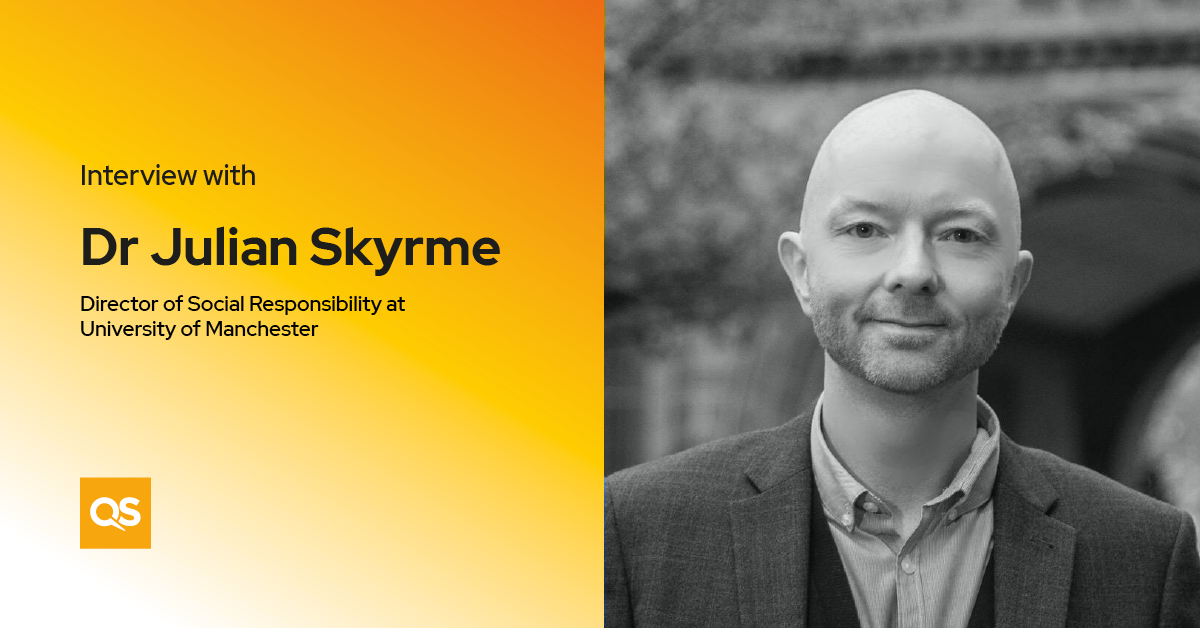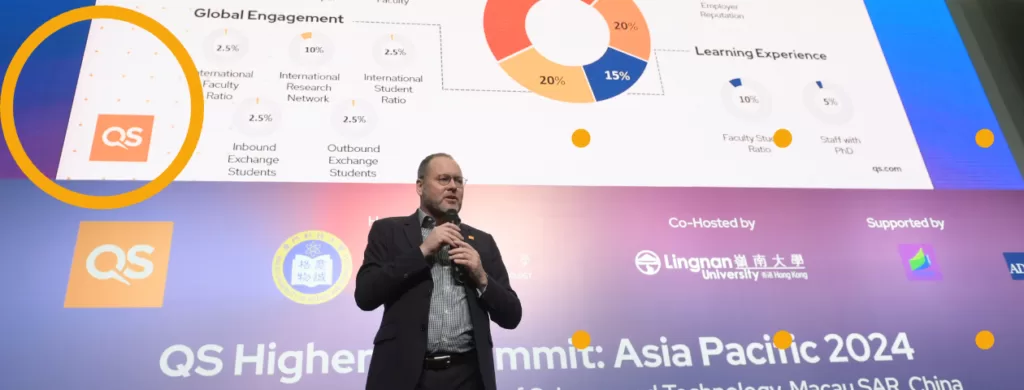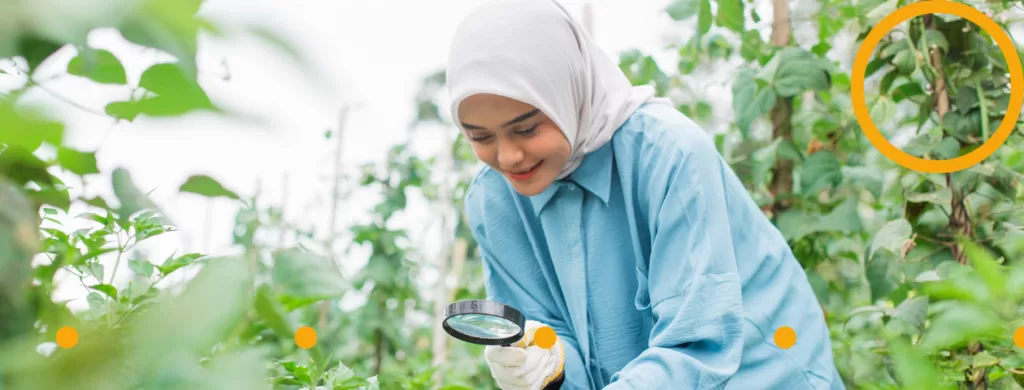
Based in the world’s first modern industrial city, the University of Manchester often finds itself at the forefront of change. Whether it’s welcoming the suffragette Christabel Pankhurst and her becoming their first female law graduate in 1906, or hosting Alan Turing as he worked on one of the world’s first computers, Manchester has a habit of innovation. In its bicentennial year, the University of Manchester continues to push forward, and make a real impact in an area affecting us all – sustainable development.
Following the University of Manchester achieving 1st in Europe and 3rd in the world in the QS World University Rankings: Sustainability 2024, we spoke with Dr Julian Skyrme. As the founding Director of Social Responsibility, he’s pioneered recent initiatives that have seen change in Manchester and beyond.
Why is sustainability important to the University of Manchester?
“Sustainability is important to the whole sector. I think higher education exists to do things for the public good, and so sustainability, sustainable development, and social responsibility are all key for universities in that work.
“Additionally, young people want to know that where they go to study is a place that fits in with their own values, thinking and aspirations about the type of future they want to create.”
Universities working towards the UN’s Sustainable Development Goals
“There are four ways the University – and universities more widely – contribute to the SDGs. First, you can research the issues. Find new technologies, generate new knowledge, approaches and understandings.
“The second is teaching and learning. University students are likely to end up in leadership positions, so they have more influence than an average person. The real impact of a university’s teaching and learning is what graduates go on to do afterwards.
“Third is public engagement. Universities need to share their knowledge. Be that through TV, radio, going into schools, working with museums, libraries, public events. There are so many ways universities can give back. University academics are also highly trusted, so we have a special responsibility to put them at the forefront of public discourse.
“Fourth is our own operations. We’re big landowners, contributing carbon emissions. Universities are often among the largest employer in their home city, and we also have huge amounts of purchasing power – it really matters where we source our supplies from.
“It’s my job as Director of Social Responsibility to think in a holistic way about these four interlocking impacts that we have.”
What sustainability initiative are you most proud of?
“It’s when you can point to something and say, ‘without that initiative, this would never have happened.’ One example is when the Mayor of Greater Manchester, Andy Burnham, set his target to be zero carbon by 2038. He chose that because the science from the University of Manchester helped set a scientific target. Whenever I see that reference to 2038, I know it was my colleagues that help set that target – and this applies to the biggest names in Manchester, our football teams, the council, the NHS.
“Away from environmental work, we also work with the Greater Manchester Combined Authority on #BeeWell to measure and understand young people’s wellbeing while they’re in school. During the pandemic, people presumed young people needed more schooling to catch up, but when we spoke to young people, we found a crisis of wellbeing. Eco-anxiety, identity issues, neurodiversity, social media and a precarious view of the future were all more important for young people. And now, I see the impact of this initiative. My own children’s school in Manchester are doing great quality work on the back of this research.”
How will achieving number one in Europe in the QS World University Rankings: Sustainability 2024 impact your student recruitment strategy?
“Where sustainability features in young people’s decision making has been slowly but surely going up as a factor, so, I’m sure doing well in these rankings will have some kind of impact, among various others.
“Where it has real benefit is reinforcing our reputation for social and environmental change – it’s a longstanding part of the identity of the University of Manchester, and we’re a university associated with progressive social change.”
How does the University of Manchester embed their newest sustainability research into the curriculum?
“Research-intensive universities like ours are constantly moving between the latest research and applying this to how we do teaching. Sustainability is relevant across subject areas – in sociology you may research how different social backgrounds identify with environmentalism; if you’re an atmospheric chemist, you’d be learning about the chemistry of air pollution. On top of this, we enable students to have a common level of knowledge through a sustainability challenge in their first year. Any student can take additional units as part of our University College for Interdisciplinary Learning – many of which are focused on sustainability and the SDGs. It’s in these units where we have students from a variety of subjects come together to share perspectives in a cross disciplinary way. This type of working reflects the real world that we live in, the jobs they’ll go in to, or the research they will carry out.
“We also work with industry through our University Living Lab, where organisations can set tasks for our students to do. Based on their subject area, we match them with real-world projects – for example, the Canals and Riverside Trust might be wondering what type of fish species live in canals, and our life science students from the university can do a research project on that.”
What’s one thing institutions can do to be more sustainable?
“As a sector, we generally have a good understanding of our scope one and two emissions – respectively, that’s emissions burnt on campus, and emissions burnt off-campus arising from the use and purchase of power like electricity, gas, oil and cooling. I think everybody now needs to understand their scope three emissions better. These are the carbon emissions from all other indirect emissions upstream and downstream. This includes purchasing of university laptops, student and employee travel, investments and waste disposal – all of which add substantially to emissions.
“It’s really difficult to measure. Actually, the methodologies behind how you calculate scope three emissions are still developing in their accuracy and acceptability. It’s really important that you don’t let that get in the way, because it’s an irrefutable fact that universities have many more emissions beyond the heating and cooling power we are using today. It’s something we need to come to terms with, and it has profound existential questions around universities and how they do their teaching and learning, and the net effect of what we do.”
How do students shape the University of Manchester’s sustainability strategy?
“Our students are around 80% of our campus community, the remainder being staff. So, they’re absolutely critical. That means they make a huge contribution – they’re the ones we pass on our newfound knowledge to.
“Perhaps the most significant impact of a university’s teaching and learning is what graduates go on to do afterwards.”
“Students also bring different perspectives. It’s a gift to have all these young people so close to our teachers, who are also our researchers – they face different issues and have new ideas.
“Universities are likely to be the most tangible big institution students are in contact with, so they question us before they can start critiquing their workplace or government. We have our student body who have a sense of idealism, and a want to see practical action and to change their corner of the world.”



